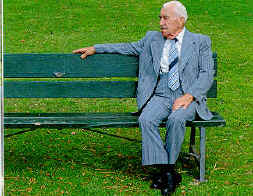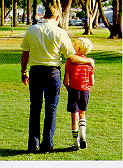Trials: How You Can Help Others
Do you know how to help a person who’s dealing with death — whether his or her own impending death or that of a loved one?
 Death is real. It occurs all around us, and sometimes it hits very close to home. And when it does, death finds most of us totally unprepared to deal with it. We tend to exalt youth, life and energy, and almost deny the existence of old age and death. It’s as if we’re all pretending to be immortal, and we live as if not thinking about old age will make sorrow and death go away.
Death is real. It occurs all around us, and sometimes it hits very close to home. And when it does, death finds most of us totally unprepared to deal with it. We tend to exalt youth, life and energy, and almost deny the existence of old age and death. It’s as if we’re all pretending to be immortal, and we live as if not thinking about old age will make sorrow and death go away.
There’s often anger accompanying the grief of the loss of life. People get angry at God, angry with their relatives and comforters, even angry at the deceased. One widow I know of blurted out to her deceased husband, “How could you go off and leave me at a time like this?” Needless to say, the rest of the family members were pretty much at a loss to know what to say. How do you deal with anger — even irrational, displaced anger — at times like that? What do you say?
And then, of course, there may be guilt. Why didn’t I do this or that or say the other thing before he died? Or, If I had only thought to do this or not do that, maybe she wouldn’t have died.
Four simple things
Here are four simple, basic things you can do to help people in a time of crisis and bereavement, four practical ways to be genuinely helpful to others in their hour of need: 1) Listen to them; 2) let them feel what they’re feeling; 3) help them in practical ways; and, 4), learn from them.
You need to know these, because as a friend, relative or loved one, you have enormous potential at such times to either help or hurt. We’ve all heard of situations where people said the wrong thing and caused deep hurt. None of us wants to add to another’s pain in times such as these. We all want to be helpful and competent. But it takes more than just being well-meaning. We have to know what to do.
Often when we’re faced with another person’s grief and bewilderment, we desperately scramble in our minds, trying to find the right thing to say. What we often forget is that what the bereaved person needs most is someone who will listen. So the first thing we need to be prepared to do for people in these crises is just listen to them. Nothing you can say or do is likely to be as helpful as simply listening to them.
 I wanted to talk
I wanted to talk
Notice how one newly widowed woman wrote of her experience in the days and weeks just after her husband died:
“Alone in my house, I longed for someone to call. Watching from my window, I desperately hoped every car slowing down, or footsteps approaching, might be a visitor. Anyone would have done. I wanted to talk. But if they came and spoke on any subject other than the one most on my mind, then equally I longed for them to leave and sometimes fear I made it obvious.”
More than anything, this widow wanted to talk to someone — anyone — who would simply listen. Long ago, the apostle James gave advice to Christians as listeners, when he wrote in James 1:19, “My dear brothers, take note of this: Everyone should be quick to listen, slow to speak….” Let’s remember to be “quick to listen” to people going through these difficult times.
You’ll notice that people dealing with death and dying often have a lot to say and an urgency to say it. They’re experiencing powerful emotions and often feel as if they’re going to go crazy if they can’t tell someone what they’re going through. They need to talk, and they desperately need someone to listen. Can you do that? Can you keep your mouth closed and your ears open?
Sometimes you won’t know how to respond or what to say. Then try not saying anything. There’s a power and a beauty in silence. There’s also the message: “I’m here. I’m with you. I don’t know what to say, but I won’t run away, and I’m going to hang in there with you the best I can.” That message will be remembered long after the words are forgotten. Much, much more could be said about the power of listening, the power of the ears, but let’s continue.
 Let them grieve
Let them grieve
The next thing you can do for those in the shock and sorrow of death and dying is let them feel what they’re feeling. In other words, don’t try to talk them out of their feelings or push them away from their feelings. We can do that, if we’re not careful, with phrases like: “You mustn’t feel that way, dearie.” “Buck up and be brave.” “Cheer up, honey; everything will work out in the end.” “Don’t cry. It’s time to quit crying and move on now.”
Advice like that usually comes not from trying to meet the other person’s needs, but our own. It comes from our inability to deal with their feelings, our discomfort at seeing their tears, hearing their grief. Don’t tell grieving people not to grieve. They need to grieve. Don’t tell them to stifle and choke back their tears and not cry. They need to cry.
Modern investigation into the subject of grief and what is commonly called “grief work” has only confirmed what the Bible has said for many centuries. Notice what was written in the book of Romans long ago by the apostle Paul: “Rejoice with those who rejoice; mourn with those who mourn. Live in harmony with one another” (Romans 12:15-16). Can we do that? Be of the same mind? To weep with them rather than tell them not to?
Let them feel and express what they’re feeling inside — the anger, the hurt, the fear, the guilt, the sorrow. It won’t hurt you to hear it, and it will very likely help the other person beyond words to express. Don’t expect their words and thoughts to be rational and logical. They’ll have ups and downs and sometimes wild mood swings. Grief has a logic of its own. It often makes sense across time — and getting through it does take time.
One woman who had just lost her child to a sudden illness and death said to those who were trying to calm her down, “Don’t take my grief away from me.” Some may not understand those words, but they make a lot of sense. She had just lost her child. She was entitled to her grief. She hadto grieve. She would have been doing violence to her mind and her body to try to keep it in and hold it back.
Let people grieve their losses. Don’t try to take their grief away from them. Let them cry and weep and mourn for the dead. It’s healthy and wise to do so. It actually speeds the recovery process, while stifling the emotions only delays it and prevents it. You won’t help those grieving by walling them off from their true feelings, so let them feel what they’re feeling.
Help in practical ways
The third suggestion is simply to help in practical ways. In times of grief, we sometimes make the mistake of focusing on a person’s spiritual or emotional needs, and forget his or her physical needs for simple things like food, transportation or paying the bills.
While someone is going through such a crisis, certain simple tasks can be difficult or unfamiliar — like balancing the checkbook or getting the car serviced. To the bereaved, mundane tasks seem almost irrelevant and very tedious and hard to do. All these ordinary tasks of daily living still need attention, but some of these things may seem difficult, virtually impossible, for the person in a state of shock and grief.
How can you help in these practical ways? There’s a simple way to find out — just ask them. Ask, “Is there anything you need?” Or, “Is there anything you want me to do?”
Something like getting a spouse’s clothes out of the closet for the funeral, or contacting the relatives, may be needed and appreciated beyond words to express. Remember that the grieving person has been hit a severe blow and has, in most cases, greatly decreased energy for even simple tasks. That person needs to be able to lean on you for support — sometimes quite literally. Let people in grief lean on you for whatever you can reasonably supply at this critical time.
If they’re having a hard time even identifying their needs and asking for help, ask yourself, What would I need if I were in this same position? Then check to see if they want your help in that area. “Can I help with the kids?” “Do you want me to answer the phone?” Sometimes the need is obvious and apparent. “Let me make the meals for you for a while.”
To a person weakened and fatigued by shock and grief, little things really mean a lot, so look for practical ways of helping such people and giving them some relief.
Learn from them
Fourth, and finally, there’s a way we can benefit from people facing the most severe of all life’s trials — we should learn from them. People in touch with death and dying are coming to grips with their own mortality. And even though they’re having a rough time handling it, they may be more in touch with reality than you are.
Let’s face it, death is an inevitable part of human life. The Bible makes clear in Hebrews 9:27 that everyone “is destined to die once.” Whether we want to face it or not, we’re all going to die someday. Nobody lives forever in this flesh. We’re all mortal human beings, and people who are dealing with that fact can be powerful teachers if we’re ready and willing to hear what they have to say.
People who have had a brush with death are often wiser and more in touch with the things that really matter. You can learn a lot from such experiences — or from others who have gone through them. Here again, in the Bible we find practical advice and wisdom in these matters that can guide us in our times of trial.
Notice this instruction in Ecclesiastes 7:2: “It is better to go to a house of mourning than to go to a house of feasting, for death is the destiny of every man; the living should take this to heart.” The “house of mourning” would be a home where a death had occurred, or perhaps today we’d say a funeral home. The “house of feasting” may be a party, a restaurant or a dance hall. God’s Word here says there’s something to learn at the house of mourning that we should take to heart — and that lesson includes our mortality, our frailty and the shortness of human life.
The passage even goes on to say that “Sorrow is better than laughter, because a sad face is good for the heart. The heart of the wise is in the house of mourning, but the heart of fools is in the house of pleasure” (verses 3-4). Have you ever learned something from sorrow? From grief? From loss? Or from those who were going through it?
For many people, the lessons learned through such life-threatening trials have been pivotal, life-changing gains in understanding. From these experiences, their lives have been permanently changed for the better. Faced with death and coming to grips with the shortness of human life, many people begin for the first time to ask some searching questions about life, death and the possibility of a life hereafter.
Why change is necessary
When confronted with death, many people find themselves asking the age-old question that was asked by Job. We read it in Job 14:14: “If a man dies, will he live again?” What’s the answer to that question? Do you know? Is this life all there is, or is there a life hereafter that we can look forward to? Do you know how Job answered that question? Let’s read on in verse 14: “All the days of my hard service I will wait for my renewal to come.” Yes, Job was expecting a change, a renewal — a change from temporary human life to eternal, spiritual life. That was Job’s hope.
He said in verse 15, “You will call and I will answer you; you will long for the creature your hands have made.” But when will God call? When will we answer? And when will God finally have the desired work of his hands? According to the Bible, all this will occur in the resurrection from the dead, spoken of in many passages in the Scriptures. In the New Testament, 1 Corinthians 15 is known as “the resurrection chapter,” and it, too, speaks of this change that Job anticipated.
Consider what the apostle Paul had to say in 1 Corinthians 15:50-51: “I declare to you, brothers, that flesh and blood cannot inherit the kingdom of God, nor does the perishable inherit the imperishable. Listen, I tell you a mystery: We will not all sleep, but we will all be changed….” God never intended that we be immortal in the flesh. That was never his purpose. But he does intend that we all be changed — and that change involves the inevitable death of our mortal bodies.
When you begin to understand God’s purpose for death, you’re beginning to understand the real purpose of life. We all love and cherish life. Our lives and the lives of our loved ones are precious and important to us, as they should be. But we need to understand that these short, mortal, perishable lives we prize so dearly are not the final form nor the highest form of life. At their best, they only begin to suggest what wonderful plans God has in mind for us in the future.

